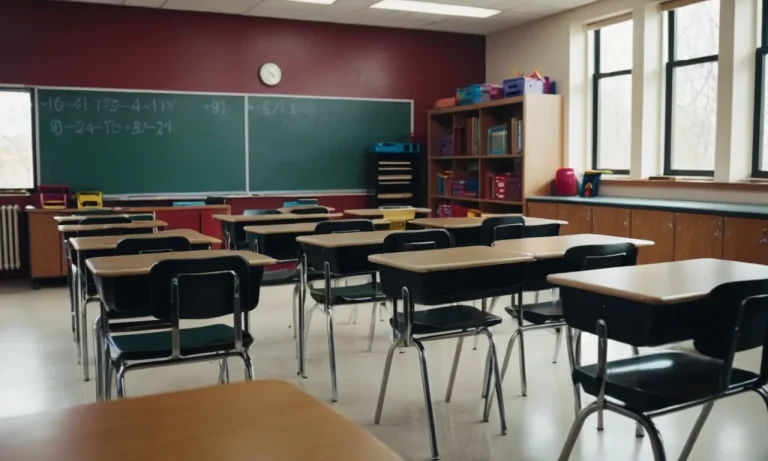In today’s world, where information is readily available at our fingertips, the topic of sexual education remains a controversial and often taboo subject. However, the importance of providing comprehensive sexual education in schools cannot be overstated.
It is a crucial aspect of a child’s development, equipping them with the knowledge and skills necessary to navigate the complexities of relationships, consent, and personal well-being.
If you’re short on time, here’s a quick answer to your question: Sexual education should be taught in schools because it empowers young individuals with accurate information about their bodies, promotes healthy relationships, prevents unintended pregnancies and sexually transmitted infections, and fosters an environment of respect and consent.
In this comprehensive article, we will delve into the multifaceted reasons why sexual education is an essential component of a well-rounded education. We will explore the benefits it offers to individuals, communities, and society as a whole, addressing the concerns and misconceptions surrounding this crucial topic.
Promoting Healthy Relationships and Consent
Understanding Consent and Boundaries
Consent is a vital component of any healthy relationship, and it’s crucial for young people to understand its significance. It’s not just about saying “yes” or “no” – it’s about respecting each other’s boundaries, communicating openly, and ensuring that both parties feel comfortable and safe.
According to RAINN, an anti-sexual violence organization, an American is sexually assaulted every 68 seconds. This staggering statistic highlights the importance of teaching consent and boundaries from an early age.
Comprehensive sexual education programs should cover topics such as recognizing the signs of an unhealthy or abusive relationship, how to set and respect personal boundaries, and the concept of enthusiastic consent.
By fostering an environment where open communication is encouraged, students can learn to navigate relationships in a respectful and empowering manner. It’s essential to emphasize that consent can be withdrawn at any time, and that “no” means “no,” regardless of the circumstances.
Building Respectful Relationships
Healthy relationships are built on a foundation of mutual respect, trust, and open communication. Sexual education curricula should aim to equip students with the knowledge and skills necessary to develop and maintain positive relationships.
This includes addressing topics such as effective communication strategies, conflict resolution techniques, and the importance of treating partners with kindness and empathy.
Additionally, it’s crucial to challenge harmful gender stereotypes and promote gender equality. According to a study by UNICEF, gender-based discrimination and violence remain significant barriers to achieving gender equality worldwide.
By fostering an environment that celebrates diversity and promotes inclusivity, students can learn to build relationships based on mutual understanding and respect for one another’s identities and experiences. 😊
Preventing Sexual Violence and Harassment
Sexual violence and harassment are serious issues that can have long-lasting psychological and emotional impacts on victims. Comprehensive sexual education programs should address these topics head-on, providing students with the knowledge and resources necessary to recognize and prevent such behaviors.
This can include discussions on recognizing the warning signs of abusive or coercive behavior, understanding the legal and ethical implications of sexual violence, and learning about available support services for survivors.
By fostering an environment of open dialogue and empowerment, students can develop the confidence and skills needed to speak up against harassment and violence, and to support those who have been affected.
Ultimately, the goal is to create a culture of respect and accountability, where sexual violence and harassment are never tolerated.
Empowering Individuals with Accurate Information
Dispelling Myths and Misinformation
In today’s digital age, misinformation about sexual health and relationships can spread like wildfire, leaving many individuals confused and vulnerable. Comprehensive sexual education in schools plays a crucial role in dispelling harmful myths and providing scientifically accurate information.
According to the Centers for Disease Control and Prevention (CDC), effective sex education programs can reduce sexual risk behaviors among adolescents. By addressing common misconceptions and equipping students with factual knowledge, we empower them to make informed decisions and protect their overall well-being.
Understanding Anatomy and Physiology
One of the key components of sexual education is providing a comprehensive understanding of human anatomy and physiology. This knowledge not only fosters body awareness but also promotes self-care and responsible decision-making.
According to a study published in the Journal of Adolescent Health, adolescents who received comprehensive sex education were more likely to delay sexual initiation and use effective contraceptive methods when they became sexually active.
By demystifying the biological processes involved in reproduction and sexual health, students can develop a healthy and respectful relationship with their bodies.
Fostering Body Positivity and Self-Acceptance
In a world where unrealistic beauty standards and body-shaming are prevalent, sexual education plays a vital role in promoting body positivity and self-acceptance. According to Planned Parenthood, comprehensive sex education programs should address topics such as body image, gender identity, and sexual orientation.
By creating an inclusive and supportive environment, students can develop a positive self-image and embrace diversity. This, in turn, can lead to healthier relationships, improved mental health, and a more inclusive society.
Empowering individuals with accurate information through sexual education is not just about imparting knowledge; it’s about fostering a culture of respect, consent, and personal agency. By equipping students with the tools they need to navigate the complexities of sexual health and relationships, we can create a generation of well-informed and confident individuals who can make responsible choices and lead fulfilling lives.
😊 Don’t let the myths and misinformation hold you back – embrace the power of knowledge and celebrate the beauty of your unique self!
Preventing Unintended Pregnancies and STIs
Comprehensive sex education plays a crucial role in preventing unintended pregnancies and the spread of sexually transmitted infections (STIs). By providing young people with accurate and age-appropriate information about contraception, safe sex practices, and sexual health, schools can empower them to make informed decisions and take control of their sexual well-being.
Comprehensive Sex Education and Contraception
A well-rounded sex education curriculum should cover various contraceptive methods, their effectiveness, and proper usage. This knowledge equips young people with the tools they need to prevent unintended pregnancies.
According to the Centers for Disease Control and Prevention (CDC), comprehensive sex education has been shown to delay the initiation of sexual activity and increase the use of contraception among sexually active youth.
Reducing Teenage Pregnancy Rates
By promoting comprehensive sex education, schools can play a significant role in reducing teenage pregnancy rates. The United States has one of the highest rates of teenage pregnancy among developed nations, with approximately 194,000 babies born to teenage mothers in 2017. However, states and communities that have implemented comprehensive sex education programs have seen a decline in these rates.
For example, according to the Guttmacher Institute, Colorado’s teen birth rate dropped by 59% between 2009 and 2018 after implementing a comprehensive sex education program.
Promoting Sexual Health and Well-being
Beyond pregnancy prevention, comprehensive sex education also plays a vital role in promoting sexual health and well-being. By educating young people about STIs, their symptoms, transmission, and prevention methods, schools can empower them to take proactive measures to protect themselves and their partners.
This knowledge can lead to a reduction in the spread of STIs and promote overall sexual health.
Moreover, comprehensive sex education can foster open and honest conversations about sexuality, consent, and healthy relationships. These discussions can help young people develop a positive and respectful understanding of sexuality, which can have long-lasting impacts on their emotional and mental well-being. 😊
Fostering an Inclusive and Supportive Environment
Addressing Gender and Sexual Diversity
Comprehensive sexual education should embrace and celebrate diversity in gender identities and sexual orientations. By acknowledging and validating the experiences of LGBTQ+ individuals, schools can create an environment where all students feel seen, heard, and accepted.
This inclusive approach not only promotes understanding and empathy but also helps to dismantle harmful stereotypes and biases. According to a study by GLSEN, LGBTQ+ students who attend schools with inclusive curricula and policies report higher levels of self-esteem and academic achievement.
Combating Stigma and Discrimination
Stigma and discrimination surrounding sexual health and sexuality can have profoundly negative impacts on individuals’ well-being and personal development. Comprehensive sexual education plays a crucial role in challenging these harmful attitudes and promoting acceptance and respect.
By providing accurate, non-judgmental information and fostering open discussions, schools can help students develop empathy, break down prejudices, and cultivate a culture of inclusivity. As stated by the United Nations, addressing stigma and discrimination related to sexual and reproductive health is essential for achieving gender equality and realizing the human rights of all individuals.
Creating Safe Spaces for Open Dialogue
Discussing topics related to sexuality and relationships can be challenging for many students, especially in environments where these subjects are taboo or met with discomfort. By creating safe spaces for open dialogue, comprehensive sexual education empowers students to ask questions, share their perspectives, and explore their thoughts and feelings without fear of judgment or ridicule.
This open communication not only fosters a deeper understanding of the subject matter but also promotes emotional intelligence, self-awareness, and healthy communication skills. According to a study by Planned Parenthood, students who participate in comprehensive sexual education programs are more likely to have open and honest conversations about sexuality with their parents or trusted adults.
Fostering an inclusive and supportive environment through comprehensive sexual education is essential for promoting the overall well-being, self-confidence, and personal growth of all students.
Conclusion
Sexual education in schools is not merely about imparting knowledge; it is a fundamental step towards creating a society that values respect, consent, and personal autonomy. By equipping young individuals with accurate information and fostering an environment of open dialogue, we empower them to make informed decisions, build healthy relationships, and navigate the complexities of their sexual and reproductive health.
Comprehensive sexual education is a powerful tool that transcends individual well-being and extends its impact to communities and society as a whole. It plays a crucial role in preventing unintended pregnancies, reducing the spread of sexually transmitted infections, and promoting a culture of respect and consent.
By addressing this crucial aspect of education, we pave the way for a future where individuals can embrace their sexuality with confidence, understanding, and empowerment.






